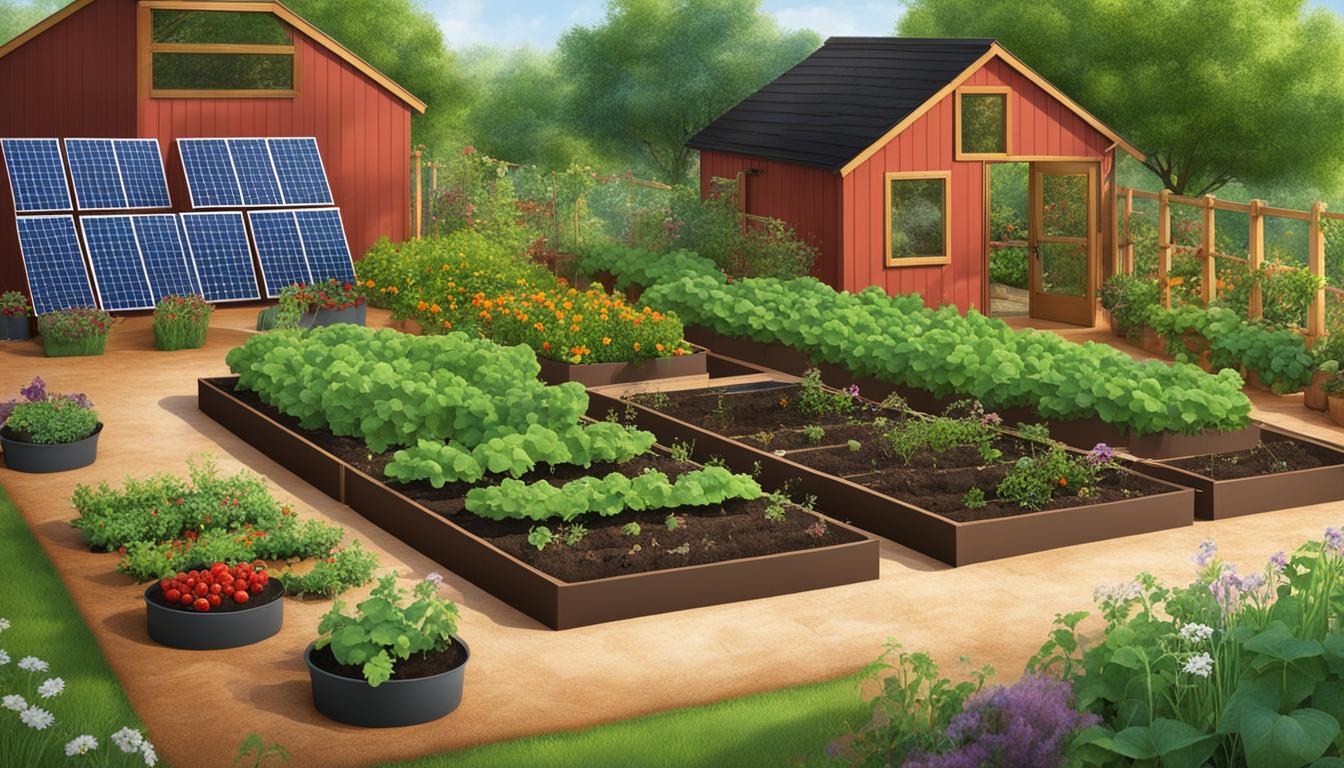Welcome to our guide on sustainable living practices! In this article, we will explore eco-friendly lifestyle choices and provide you with green living tips to help you make a positive impact on the environment. By adopting these practices, you can reduce your environmental footprint and contribute to a greener future.
Sustainable living practices encompass a wide range of actions that individuals can take to promote sustainability in their daily lives. From conscious shopping to minimizing plastic usage, embracing sustainable food choices, making conscious choices in transportation and energy usage, and more, there are numerous ways to live a more eco-friendly lifestyle.
Key Takeaways
- By adopting sustainable living practices, you can reduce your environmental footprint and contribute to a greener future.
- Conscious shopping involves thinking twice before making a purchase and opting for secondhand products and minimal packaging.
- Minimizing plastic usage by using reusable bags and avoiding single-use water bottles and straws can significantly reduce plastic pollution.
- Embracing a plant-based diet, reducing food waste, and choosing organic products support sustainable agriculture.
- Making conscious choices in transportation, such as walking, biking, carpooling, and using renewable energy sources, reduces carbon emissions.
Now that you have an overview of sustainable living practices, let’s dive deeper into each area to discover practical steps you can take towards a greener life.
Reduce Your Environmental Impact through Conscious Shopping
Every product we purchase has an environmental footprint, from its creation to its packaging and disposal. To reduce our impact and embrace sustainable living strategies, we can practice conscious shopping. This involves thinking twice before making a purchase and considering whether we truly need the item. By being mindful of our consumption habits, we can minimize unnecessary waste and reduce our overall environmental footprint.
One effective way to lower our impact is by embracing secondhand shopping. Opting for secondhand products not only reduces the demand for new production but also extends the lifespan of items, preventing them from ending up in landfills. Thrift stores, online marketplaces, and community swap events are great places to find pre-loved treasures while reducing environmental waste.
Another important aspect of conscious shopping is choosing products made from lower-impact materials. When buying clothing, for example, opt for garments made from recycled or organic fibers, which have a lower environmental impact compared to conventional materials. Additionally, prioritize products that come with minimal packaging to minimize waste. By selecting items with lower-impact materials and packaging, we can contribute to sustainable production and consumption practices.
Remember, every purchase we make is a vote for the type of world we want to live in. By consciously choosing products that align with our values and contribute to a lower environmental footprint, we can make a positive impact on the planet.
Minimize Plastic Usage and Switch to Reusable Alternatives
Plastic pollution is a grave environmental issue that requires immediate attention. Every year, millions of tons of plastic end up in the ocean, threatening marine life and ecosystems. To combat this problem, it’s essential to ditch plastic and embrace reusable alternatives. By making simple changes in our daily lives, we can significantly reduce our contribution to plastic pollution.
The Impact of Plastic Pollution
Plastic pollution poses a significant threat to our planet’s health. It contaminates water sources, harms marine animals, and negatively impacts ecosystems. Additionally, the production and disposal of plastic contribute to greenhouse gas emissions and climate change. By understanding the severity of this issue, we’re motivated to take action and make a difference.
Steps Towards a Plastic-Free Lifestyle
Transitioning to a plastic-free lifestyle may seem daunting at first, but small changes can make a big impact. Here are some practical steps you can take:
- Ditch single-use water bottles: Instead of buying water in disposable plastic bottles, invest in a reusable water bottle. Not only will this save money in the long run, but it also helps reduce plastic waste significantly.
- Carry reusable bags: When shopping, opt for reusable bags made from sustainable materials like cotton or jute. These bags are sturdy, eco-friendly, and can replace hundreds of single-use plastic bags.
- Avoid disposable straws: Single-use plastic straws are often used for a few minutes before being discarded. Switch to reusable alternatives like metal or bamboo straws to reduce plastic waste.
- Choose plastic-free products: Look for plastic-free alternatives for everyday products such as shampoo, conditioner, and personal care items. Many brands now offer plastic-free options, packaged in environmentally friendly materials.
Visualizing the Impact
Let’s take a look at the significant impact of using reusable bags instead of single-use plastic bags.
| Average Annual Usage | Plastic Pollution | |
|---|---|---|
| Single-Use Plastic Bags | 100 bags per person | + |
| Reusable Bags | 1 bag per person | Significantly reduced |
Embrace Change for a Plastic-Free Future
By minimizing plastic usage and switching to reusable alternatives, we can make a positive impact on the environment. Remember, every small change counts. Together, we can create a plastic-free future and protect our planet for generations to come.
Embrace Sustainable Food Choices and Reduce Waste
The food we consume plays a significant role in shaping the health of our planet. By embracing sustainable food choices and reducing waste, we can make a positive impact on the environment. Here are some practical ways to incorporate sustainable practices into your daily food habits:
- Adopt a Plant-Based Diet: Consider incorporating more plant-based meals into your diet. Plant-based diets have been proven to reduce greenhouse gas emissions and promote sustainable agriculture. By reducing your meat consumption and exploring delicious plant-based alternatives, you can lower your carbon footprint and support a more sustainable food system.
- Reduce Food Waste: Food waste is a major issue that contributes to environmental degradation. Minimize waste by practicing smart shopping habits and proper consumption. Plan meals ahead, make a shopping list, and buy only what you need. Utilize leftovers creatively and compost food scraps whenever possible. These small changes can go a long way in conserving natural resources and reducing greenhouse gas emissions.
- Choose Organic Products: When purchasing groceries, opt for organic products whenever possible. Organic farming methods prioritize the use of natural fertilizers and sustainable practices that promote soil health and biodiversity. By choosing organic, you support sustainable agriculture and help protect wildlife and ecosystems from the harmful effects of synthetic pesticides.
- Support Sustainable Farming: Look for labels and certifications such as “fair trade” or “sustainably sourced” when buying food products. These labels ensure that the food you purchase has been produced using sustainable farming practices, which prioritize environmental conservation and the well-being of farmers and farm workers.
“The choices we make about the food we eat have a direct and significant impact on the environment. By embracing sustainable food choices and reducing waste, we can contribute to a healthier planet for future generations.”
By embracing sustainable food choices, you not only promote a greener planet but also support your own well-being. So, let’s make conscious decisions when it comes to what we eat and how we reduce waste, leading the way towards a more sustainable future.

Make Conscious Choices in Transportation and Energy Usage
Transportation and energy usage play a significant role in carbon emissions and air pollution, making it crucial to adopt sustainable practices in these areas. By making conscious choices, you can contribute to a greener future and reduce your environmental impact.
1. Opt for Sustainable Transportation
Instead of solely relying on personal vehicles, consider greener transportation options that promote sustainable living. Walking or biking for short distances not only reduces carbon emissions but also improves your physical and mental well-being. Additionally, carpooling and using public transportation decreases the number of vehicles on the road, leading to reduced congestion and a smaller carbon footprint.
2. Transition to Renewable Energy Sources
Reducing your reliance on non-renewable energy sources is essential in achieving energy efficiency and combatting climate change. Consider investing in renewable energy for your home, such as solar panels or wind turbines. These alternatives can significantly reduce your carbon emissions and help create a more sustainable future.
3. Embrace Energy-Efficient Appliances
Energy-efficient appliances are designed to consume less energy while delivering the same functionality. By replacing old and inefficient appliances with energy-efficient models, you can lower your electricity usage and reduce your carbon footprint. Look for appliances with Energy Star ratings, as they meet strict energy-efficiency standards.
4. Practice Energy-Saving Habits
Simple every day habits can make a significant difference in energy conservation. Remembering to turn off lights when you leave a room, unplugging electronics when not in use, and adjusting your thermostat to conserve energy are all effective ways to reduce your environmental impact. Small changes can add up to significant energy savings over time.
“Making conscious choices in transportation and energy usage is key to reducing carbon emissions and fostering sustainability. By opting for sustainable transportation methods and transitioning to renewable energy sources, we can contribute to a greener future for all.”
By making conscious choices in transportation and energy usage, you can play a part in reducing carbon emissions and promoting sustainability. Adopting sustainable transportation practices, transitioning to renewable energy sources, embracing energy-efficient appliances, and practicing energy-saving habits are all important steps towards a more eco-friendly lifestyle. Together, we can make a positive impact on the environment and create a greener future for generations to come.
Embrace Sustainable Living Practices for a Greener Future
Adopting eco-conscious living ideas and incorporating planet-friendly habits in your daily life is crucial for environmental conservation and ensuring a greener future for generations to come. By making mindful choices in various aspects of your life, you can contribute to protecting the planet and enjoy the benefits of a healthier lifestyle.
Sustainable living practices not only reduce your ecological footprint but also promote personal well-being. From adopting a plant-based diet and reducing food waste to embracing eco-friendly transportation options and using renewable energy sources, there are numerous ways to make a positive impact on the environment.
To start your green journey, consider implementing simple yet impactful changes in your daily routine. Opt for reusable products like bags, water bottles, and containers to reduce single-use plastic waste. Choose organic and locally grown produce to support sustainable agriculture and minimize the use of harmful pesticides. Additionally, explore alternative transportation methods such as biking, walking, or carpooling to reduce carbon emissions and improve air quality in your community.
By embracing these sustainable living practices, you become an agent of change, actively contributing to environmental conservation. Not only do you help protect the planet, but you also inspire others to follow suit. So, let’s join hands and create a greener future through eco-conscious living ideas and planet-friendly habits. Start small, but think big – together, we can make a significant difference!
FAQ
What are sustainable living practices?
Sustainable living practices encompass a wide range of actions that individuals can take to reduce their environmental footprint and live a more eco-friendly lifestyle.
How can I reduce my environmental impact through conscious shopping?
To reduce your impact, you can practice conscious shopping by thinking twice before making a purchase, considering whether you truly need the item. Opting for secondhand products instead of new ones and choosing products made from lower-impact materials with minimal packaging and shipping can further contribute to sustainability efforts.
How can I minimize plastic usage and switch to reusable alternatives?
By ditching plastic and switching to reusable alternatives, such as using reusable bags when shopping, avoiding single-use water bottles and straws, and opting for products made from sustainable materials, you can significantly reduce your contribution to plastic pollution.
How can I embrace sustainable food choices and reduce waste?
You can embrace sustainable food choices and reduce waste by adopting a plant-based diet and reducing your meat consumption, which lowers your carbon footprint and contributes to sustainable agriculture. Additionally, reducing food waste through smart shopping and proper consumption, as well as choosing organic products, supports sustainable farming practices and helps protect wildlife and ecosystems.
How can I make conscious choices in transportation and energy usage?
To live more sustainably, you can drive less and opt for greener transportation options such as walking, biking, carpooling, and using public transportation. Transitioning to renewable energy sources for your homes and vehicles can also significantly reduce your carbon footprint. Using energy-efficient appliances and practicing energy-saving habits further promote sustainability and reduce your environmental impact.
Why should I embrace sustainable living practices for a greener future?
Adopting sustainable living practices is essential for creating a greener future. By implementing eco-conscious habits and making mindful choices in various aspects of our lives, we can contribute to environmental conservation and protect the planet for future generations. Sustainable living practices not only benefit the environment but also promote personal well-being and a healthier lifestyle.





